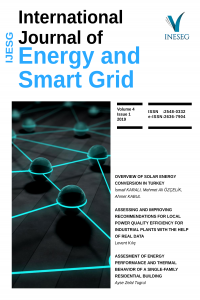Abudharr Bello WAZIRI, Siraj ALHASSAN, Jamilu Ya'u MUHAMMAD, Mohammed Abdullahi GELE, Munir USMAN, Audu Taofeek OLANIYI
ENERGY GENERATION PROSPECTS FROM SOLID WASTE OF KANO METROPOLIS MARKETS
ENERGY GENERATION PROSPECTS FROM SOLID WASTE OF KANO METROPOLIS MARKETS
The health and wellbeing of every community is intricately linked to its economic growth and standard of living. Poor solid waste management has an impact on the health and consequently economy of communities. Kano Metropolis markets have vital role to play on economic growth to Nigeria and some part of West African countries at large, on the other hand they contributes on the environmental challenges. This research work assess to way of mitigating this challenges by recycling the waste generated by these markets to convert the wastes into useful such as generating of electricity. The result of the work revealed that the food and vegetable wastes were found to larger percentage from the solid wastes followed by plastics wastes. Whereas, textile materials, paper glass/ceramics, wood, electronic and metals wastes were 21%, 25%, 12%, 9%, 8% and 32% respectively and the average power generation potential in June is higher than that of July by 350 kWh/day due to the higher calorific values during the period.
Keywords:
Dumpsites, Electricity, Landfills, Incineration, Solid Waste,
___
- Hoornweg D. and Bhada-Tata P. (2012). A global review of solid waste management.
- Moya D., Aldás C., López G. and Kaparaju P. (2017). Municipal solid waste as a valuable renewable energy resource: A worldwide opportunity of energy recovery by using Waste-To-Energy Technologies. Energy Procedia.
- Brunner, P. H. and Rechberger, H. (2015). Waste to energy-key element for sustainable waste management. Waste Management.
- Zaman, A. U. and Lehmann, S. (2013). The zero waste index: a performance measurement tool for waste management systems in a ‘zero waste city.’ Journal of Clean Prod., 50: 123–132.
- Zaman, A. U. (2014). Measuring waste management performance using the ‘Zero Waste Index’: the case of Adelaide, Australia. Journal of Clean Prod. 66: 407–419.
- Uchendu, C. (2008). Municipal solid waste treatment and recycling technologies for developing countries: A typical Nigeria case study. Journal of Solid Waste Treatment and Management, 34: 127-135.
- IEA (2011). Nigeria Renewable Energy Master Plan. Available at www.iea.org/policiesandmeasures/pams/nigeria/name-24808-en.php?
- Ayuba, K. A., Abd-Manaf, L., Sabrina A. H. and Azmin, S. W. (2013). Current Status of Municipal Solid Waste Management Practise in FCT Abuja. Research Journal of Environmental and Earth Sciences, 5(6): 295-304.
- Ogwuleka, T. C. (2009). Municipal Solid Waste Characteristics and Management in Nigeria. Iran Journal of Environmental Health, 6(3): 173-180.
- Adejobi, O. S. and Olorunnimbe, R. O. (2012). Challenges of Waste Management and Climate Change in Nigeria: Lagos State Metropolis Experience. African Journal of Sci. Res., 7(1): 346-362.
- Bichi, M.H. and Amotobi, D. A. (2013). Characterization of household solid wastes generated in Sabon-gari area of Kano in Northern Nigeria. American Journal of Research Communication, 1(2009), 165–171.
- Nyoti Stephen, G. M., Owido, S., Nyaga, D., George, O. O., and John, M. M. (2016). Classification and Characterization of Solid Waste–Case Study of Egerton University and its Environs, Kenya. International Research Journal of Engineering and Technology, 11, 2395–56.
- Mboowa, D., Quereshi, S., Bhattacharjee, C., Tonny, K., and Dutta, S. (2017). Qualitative determination of energy potential and methane generation from Municipal Solid Waste (MSW) in Dhanbad (India). Energy. https://doi.org/10.1016/j.energy
- Daura, L. A. (2016). Electricity Generation Potential of Municipal Solid Waste in Kano Metropolis. Journal of Scientific and Engineering Research, 3(4), 157–161.
- Nabegu, A. B. (2010). An analysis of municipal solid waste in Kano metropolis, Nigeria. Journal of Human Ecology, 31(2): 111-119.
- ISSN: 2548-0332
- Başlangıç: 2016
- Yayıncı: Zülküf GÜLSÜN
Sayıdaki Diğer Makaleler
ENERGY GENERATION PROSPECTS FROM SOLID WASTE OF KANO METROPOLIS MARKETS
Abudharr Bello WAZIRI, Siraj ALHASSAN, Jamilu Ya'u MUHAMMAD, Mohammed Abdullahi GELE, Munir USMAN, Audu Taofeek OLANIYI
UNDERSTANDING SOLAR POWER SYSTEM AND ITS CONTRIBUTION TO FREQUENCY REGULATION
Hemlal BHATTARAİ, Karma LODAY, Dipesh CHHETRI, Jai Ram RAI
MEASUREMENT AND EVALUATION OF POWER QUALITY PARAMETERS BATMAN PROVINCE APPLICATION
ELIMINATION OF HARMONIC COMPONENTS IN SOLAR SYSTEM WITH L AND LC PASSIVE FILTERS
